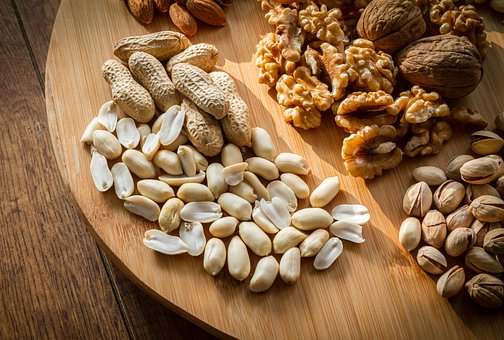Your brain is an energy-hungry powerhouse. Your brain is responsible for controlling how you feel and think, as well as your mood, memory, speech, and more. It is important to keep your body fueled with nutrient-dense foods to maintain its peak performance.
The types of food you consume have a significant impact on your brain health. These superfood seeds are full of the nutrients your brain needs for energy, concentration, mood, and memory, all of which play a role in your mental health.
Seeds and Nuts are the Best Brain Food!
It can be difficult to get all the nutrients you need from food today because there is a lot of processed food and depleted food sources. However, these seeds are a great addition to any diet because they are simple, inexpensive, and versatile.
Health Benefits of Seeds:
- Seeds contain vitamins and minerals, like magnesium, vitamin E, and zinc.
- Some seeds are also great sources of protein, and can help you meet your macronutrient goals while providing the amino acid building blocks your brain and muscles need to repair.
- Seeds are rich sources of healthy fats like omega 3, and contain more optimal ratios of omega 3 to omega 6, helping to modulate inflammation to protect the health of your brain cells from oxidative damage.
- You’ll also notice seeds are rich in fiber, so they’re an easy way to keep your appetite satisfied while also fueling healthy digestion and your gut microbiome.
What seeds and nuts can you add to your diet to improve brain function both now and in the future?
1. Flaxseeds
You can use flaxseeds to improve your brain health.
In just one tablespoon of flax, there is a decent amount of fiber as well as a type of omega 3 fats called alpha-lipoic acid.
The flax seed contains two types of dietary fiber, soluble and insoluble, which help support a diverse microbiome. Soluble fiber serves as nourishment for beneficial bacteria residing in your large intestine.
The bacteria produce neurotransmitters that are used by the brain to regulate mood and cognition.
Soluble fiber absorbs water to bulk up stools, making them softer and easier to pass. This helps to remove excess hormones and toxins that can cause oxidative stress in cells, such as the ones in your brain.
Depression has been linked to both inflammation and oxidative stress, and flax seeds may help to reduce inflammation throughout the body by promoting healthy digestion.
How to use Flax Seeds: You can get the most out of flaxseeds by grinding them before eating. This way, you can add them to baked goods, oatmeal, salads, or desserts. Flaxseed oil can be found in capsules or dark colored bottles.
2. Chia Seeds
A 2-tablespoon serving of chia seeds has 9 grams of fat, 10 grams of fiber, and 5 grams of protein. Chia seeds were relied on by ancient warriors for a quick energy source. This superfood seed has been used for its health benefits as far back as the Incan, Mayan, and Aztec cultures.
Chia seeds contain more alpha-linolenic acid than flaxseeds.
The soluble and insoluble fiber in chia seeds acts as a prebiotic and probiotic.
The good bacteria in our intestines that help produce serotonin and other important neurotransmitters that help regulate the gut-brain connection are fed by these substances.
Chia seeds are small but packed with nutritive compounds. Chia seeds are a source of fiber and omega-3 fatty acids, and also contain polyphenols.
Chia seeds can help type 2 diabetes patients to manage their blood sugar levels, according to one study.
The moderate sugar-lowering effect of chia seeds may be due to their high fiber content, which forms a gel-like substance that may help reduce the amount of sugar released by fiber.
You can also add chia seeds to yogurt, oatmeal, or salad!
How to use chia seeds: The seeds from the chia plant can be eaten without cooking them first, and will become soft and jelly-like when added to liquids.
Chia fresca is a healthy energy drink that you can make in a few minutes. You’ll need:
- 2 cups cold water
- 1 Tbsp chia seeds
- 1/2 small lime juiced
- 1/2 tsp honey or other liquid sweetener
- pinch pink Himalayan salt
In a large glass, mix together the water, chia, lime juice, honey, and salt. Make sure you stir the mixture well to avoid any clumps, then set it aside for 10 to 15 minutes. The chia seeds will settle over time, so you’ll need to stir it again. This is normal. After the seeds are hydrated, stir the glass one last time. Drink immediately.
3. Hemp Hearts
Hemp hearts are a high source of plant protein. Nuts are not only a good source of protein, but they also contain brain-healthy antioxidants and omega fats, as well as vitamin E and minerals.
Protein is critical for brain development and neurotransmitter function. Neurotransmitters are chemicals that help our nerve cells communicate with each other.
And they are necessary for the brain to function optimally and for mental health. How much protein one has in their body affects how the brain responds to dopamine, which is connected to motivation and energy.
The exterior of hemp seeds is hard, while the interior is soft and referred to as the hemp heart. Hemp seeds can be enjoyed raw, cooked, or roasted.
People typically consume the inner, hulled seed of the hemp plant. Hemp seeds can be used to create hemp seed oil or hemp milk.
Hemp hearts contain the optimal ratio of omega-6 to omega-3s, which is 2:1. This means they can help to reduce inflammation associated with oxidative stress and improving mental health.
How to use Hemp Hearts: Hemp hearts can be used ground, raw, or cooked. You can sprinkle this on top of salads, yogurt, or add it to a smoothie.
4. Sunflower Seeds
Sunflower seeds contain a ton of beneficial vitamin E. A mere quarter-cup of sunflower seeds contains more than 80% of the daily recommended value of Vitamin E, a potent antioxidant that safeguards cells from damage due to oxidative stress.
Oxidative stress is a problem for the brain because it increases with age and is linked to neurodegenerative diseases such as Alzheimer’s and dementia.
Sunflower seeds contain choline, which is a part of your brain’s master neurotransmitter, acetylcholine. Selenium, which is found in sunflower seeds, supports brain function and memory.
5. Pumpkin Seeds
Pumpkin seeds are a good source of magnesium, zinc, copper and iron, which are all important for brain health.
Magnesium is essential for a healthy brain and nervous system. It is also important for heart health, strong bones, and a healthy immune system. If you have low magnesium levels, you may be more likely to have health problems related to your nervous system, such as Alzheimer’s, migraine, anxiety, and depression.
Around half of all people are deficient in magnesium, so eating pumpkin seeds is a good way to increase your intake of this nutrient.
Zinc is important for regulating communication between brain cells, and not having enough zinc has been connected to neurological problems such as Alzheimer’s, epilepsy, schizophrenia, and depression.
6. Almonds
Almonds are one of the most popular nuts and also one of the most widely studied varieties.
Clinical trials suggest that eating a handful of almonds each day can help to control your blood sugar levels and improve your levels of good cholesterol. According to one study, eating 100 grams of almonds in addition to taking cholesterol-lowering medication helped to lower ‘bad’ cholesterol levels.
Vitamin E and magnesium are two important nutrients found in almonds. These nutrients are often deficient in the average American diet.
The antioxidants in almonds help keep our brains healthy. Almonds’ heart-healthy qualities also help improve brain health.
7. Walnuts
Walnuts have a higher concentration of polyphenols than other nuts, as well as a significant amount of alpha-linolenic acid (ALA), a type of polyunsaturated fatty acid (PUFA).
ALA is a polyunsaturated fat that is considered an essential nutrient. Our bodies do not make it naturally, so we need to get it through our diet. One of the richest sources of anti-inflammatory, neuroprotective healthy fat is walnuts.
The polyphenols in walnuts help to reduce oxidative stress, protect against cancer and may also promote healthy gut bacteria, according to new research.
8. Cashews
Though research on the health effects of cashews is limited, they are one of the most widely produced type of nut.
The health profile of cashews is often questioned because they are higher in carbohydrates and have one of the lowest levels of fiber when compared to other nuts. However, cashews are rich in monounsaturated fatty acids (MUFAs), which may help protect against heart disease.
Cashews are good for you because they contain high levels of vitamin E. This vitamin helps to keep your body free from oxidative stress, improves your immune system, and benefits your eyesight and skin.
9. Pistachios
Pistachio consumption may help to reduce the amount of glucose in your blood when you haven’t eaten, lower the amount of LDL cholesterol, and improve the amount of HDL cholesterol.
In one 2015 study, it was found that adults who regularly ate pistachios and exercised had lower LDL levels and higher HDL levels.
Pistachios contain more protein and fiber than any other type of nut, making them very filling. Pistachios contain the highest amount of phytosterols, which helps to control cholesterol levels.
10. Peanuts
While peanuts are classified as legumes, they share many nutritional qualities with nuts. Peanuts contain a high amount of protein as well as all 20 essential amino acids.
Peanuts are relatively inexpensive and easy to find, especially in the form of peanut butter. Even though peanuts are healthy, you should eat other kinds of nuts and seeds too.
Purchase natural peanut butter that does not have hydrogenated or partially hydrogenated oils to avoid trans fats, and make sure there is no added sugar.
If you want the best option, go for an oil-on-top peanut butter, but keep in mind that you’ll have to stir it and put it in the fridge (to prevent the oil from separating again). To make it easier to open a jar for the first time, turn it upside down and store it for a couple days.
This allows the oil to be absorbed before you stir it.
Tips for Purchasing, Storing, and Consuming Nuts and Seeds
- Try to purchase nuts and seeds raw, preferably unsalted or lightly salted. Some varieties of roasted nuts can be high in sodium and coated in vegetable oils, so be sure to check the label for additional information! Additionally, the high heat used in roasting can damage some of the healthy fats. We recommend buying raw and roasting at home for optimum freshness. Roast in the oven at 300 °F for 5 to 20 minutes, depending on the nut. Typically, small nuts or seeds need a shorter amount of time.
- The freshness and nutritional compounds of nuts can be affected by heat, light, and oxygen. To keep nuts and seeds from going rancid, store them in the fridge or freezer in an airtight container or sealed package.
- Get a variety. Each type of nut or seed has different levels of different nutrients—make sure you get as much of a variety as you can to reap the most benefits!
- Aim for at least 2 servings of nuts and seeds per week. Remember that a serving is about 1 ounce or ¼ cup (that’s about a small handful).
- Should you soak your nuts? Soaking beans improves their digestibility and makes the nutrients more readily available to our bodies. You may have seen the same thing recommended for nuts. However, there is very little research on the topic of soaking nuts. What little research is available suggests that soaking makes little to no difference. In fact, it may even decrease their mineral content. So, unless you are trying to make a dish that requires soft nuts, we don’t recommend soaking them. Keep soaking your beans, though!
Nuts and seeds are a healthy snack option because they contain healthy fats and other nutrients that are good for the brain. Nuts and seeds are not only widely available, but also versatile and convenient—even for busy days.









